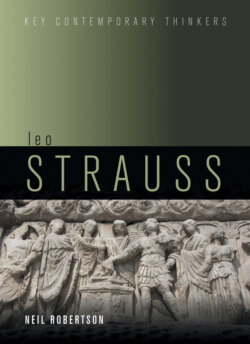Читать книгу Leo Strauss - Neil G. Robertson - Страница 13
Classical Political Philosophy
ОглавлениеA great deal of Strauss’s standpoint rests on his understanding of classical political philosophy, and many of his writings can be seen as contributions to his recovery of classical political philosophy. Strauss articulates this recovery through the interpretation of classical texts, above all texts that have as their focus the figure of Socrates, with whom Strauss associates the origin of political philosophy. The texts central to this for him are the dialogues of Plato, as well as dialogues by Xenophon, Aristophanes’ play The Clouds, and some comments by Aristotle. However, it would be fair to say that Strauss’s consideration of classical political philosophy extends to more than these works: he includes not only other works of classical philosophy and classical literature, but beyond that (and in a more complicated sense) the work of the great Jewish and Islamic philosophers, above all Alfarabi (872–950) and Maimonides, whom Strauss understands to be continuing in the practice of classical political philosophy. Still, the central and defining figure in Strauss’s account of classical political philosophy is the Socrates of Plato’s dialogues.
Strauss’s recovery of classical political philosophy is, as we have seen, a response to the crisis of modernity: nihilism. Further, in Strauss’s view, historicism – with what he sees as its moral relativism and moral nihilism – represents the most extreme manifestation of that crisis. For Strauss, what classical political philosophy does is to give access to a reality untouched by history: nature. But the “nature” Strauss finds in classical political philosophy is not a metaphysical account of nature. The traditional reading of Plato and Aristotle and other ancient philosophers finds that Plato’s and Aristotle’s standpoints bring to light a metaphysical realm of ideas or forms that underlie and cause all reality; this accords with what Nietzsche and Heidegger find. Strauss, following his esoteric reading of texts, argues that this surface or exoteric account is not the true standpoint of classical political philosophy. For the careful reader, argues Strauss, the true teaching of classical philosophy, and above all that of Plato, shows itself to be focused on philosophy as ceaseless questioning, rather than on a metaphysical solution to those questions. What Plato teaches esoterically is Socrates’ “knowledge of ignorance,” philosophy as the life dedicated to the quest or pursuit of knowledge, rather than to its possession in and by metaphysical knowledge. For Strauss, this is crucial if classical political philosophy is not going to be subject to the critiques of Nietzsche and Heidegger, who argue that the metaphysics of Plato and Aristotle in fact leads to modern nihilism.
For Strauss, the possibility of an ahistorical, non-metaphysical political philosophy rests upon recovering the Socratic beginning, seeing philosophy as arising from the philosopher entering into the agora, the space of public opinion, to begin a process of questioning and dialectic that seeks to uncover the abiding reality – nature – that public opinion points to. What this means is a turning to what people say, to their speeches, and not trying to seek an underlying causality that treats what is said in a reductionist way. In doing this, the fullness of humanity can be recovered: the “high” is not seen from the perspective of the “low.” Classical political philosophy’s turn to speeches can be seen as the beginning necessary to avoid the outcome of moral nihilism that belongs to modernity. Strauss’s whole work of scholarship is, then, a sustained effort to recover this way of doing philosophy, as the thing most needful in the face of the crisis of the West.
